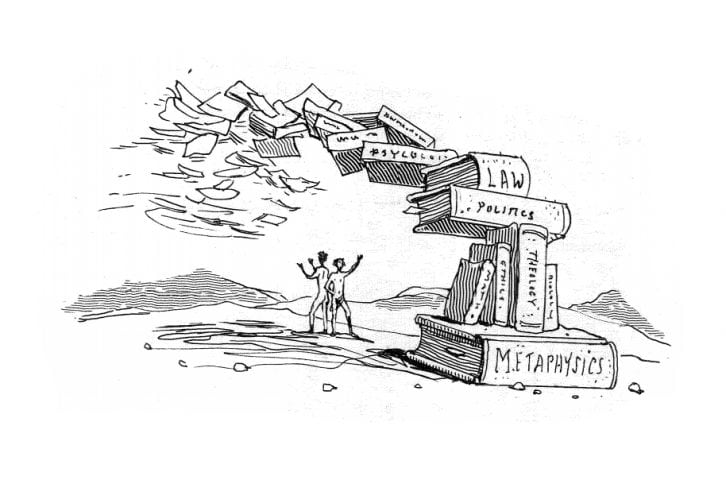Books Reviewed
A review of The Book of Five Rings, by Miyamoto Musashi, translated by William Scott Wilson.
Awhile back, Tony Soprano thanked his psychiatrist for recommending Sun Tzu's The Art of War. "I mean here's this guy, a Chinese general, wrote this thing 2,400 years ago, and most of it still applies today! …You know most of the guys that I know, they read Prince Matchabelli…. But this book is much better about strategy." Now that Paulie Walnuts is trying to make nice with Tony again, he might want to buy him The Book of Five Rings.
Dating only from the 17th century, this Japanese work on swordsmanship is not nearly as ancient as The Art of War. And whereas the latter deals broadly with strategy and tactics, the former focuses on the specifics of martial arts. Nevertheless, it does offer some insights that apply to all kinds of conflicts, whether they take place in the political arena or on a small college campus.
The third chapter, "The Fire," is particularly useful. Musashi recommends "Becoming Your Opponent," by which he means "thinking as though your body has become that of your opponent." That is sound advice. In any kind of fight, one must study the other side in order to parry strengths, exploit weaknesses, and anticipate future moves. Musashi stresses that the exercise also builds confidence. Ulysses S. Grant was thinking in this vein when he wrote of approaching the brow of a hill, expecting to confront fierce opposition on the other side. But when he reached the top, the Confederates were gone. "It occurred to me at once that [the enemy] had been as much afraid of me as I had been of him. This was a view of the question I had never taken before; but it was one I never forgot afterwards."
When you are not sure of what your foes will do, says Musashi, "act as though you were going to attack vigorously, and you will see their intentions." Early in 2001, Arnold Schwarzenegger showed how this idea works in political campaigns. After he suggested that he might run against Gray Davis, gubernatorial henchman Garry South sent reporters a fax making allegations about the Terminator's personal life. Schwarzenegger then announced that he would not be a candidate in 2002. South claimed that he had scared Schwarzenegger out of the race. In fact, Schwarzenegger probably never meant to run that year, since he had contractual obligations to film roles. It is more likely that he was merely making a feint in order to learn how his enemies would attack him. South fell for the tactic, giving Schwarzenegger a long lead-time to prepare his response. We're seeing it now.
One of Musashi's observations has gained new relevance in 2003: "[I]t is essential to grasp the rhythm of your opponents' collapse and to hasten your offensive so they cannot escape that moment." When Saddam's statue toppled, that moment had arrived.


